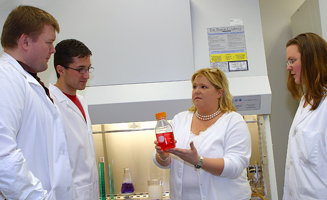Jacqueline Stephens
Professor
BMB and CDIB Divisions
PhD: East Carolina University School of Medicine, 1992
Claude B. Pennington, Jr. Endowed Chair in Biomedical Research
Pennington Biomedical Research Center
Baton Rouge, LA 70808
Phone: 225-763-2648
Office: 420 Life Sciences Building & L223 Pennington Biomedical Research Center
E-mail: [email protected]
Area of Interest
Adipocytes are highly specialized cells that play a major role in energy homeostasis in vertebrate organisms. Adipocytes are insulin-sensitive cells that have endocrine properties. Obesity is the primary disease of fat cells and a major risk factor for the development of type 2 diabetes (T2DM), cardiovascular disease, and hypertension. Obesity and its related disorders results in dysregulation of the mechanisms that control lipid storage, insulin action, and hormone secretion from adipocytes. The Stephens lab is located at Pennington Biomedical Research Center and uses both in vitro and in vivo models to adipocyte biology.
Project: The regulation and activation of STATs in adipocytes.
Significant advances towards an understanding how adipocytes contribute to disease has been made by the identification of transcription factors that regulate the differentiation of fat cells and are involved in the regulating adipocyte gene expression and effecting the function of fat cells. Our research has focused on the STAT family of transcription factors. STATs comprise a family of transcription factors that upon activation by a variety of hormones and growth factors will translocate to the nucleus. STATs can be rapidly activated to regulate gene expression and represent a relatively unexplored paradigm in the transcriptional regulation of fat cells. Our efforts have largely been devoted to growth hormone mediated activation of STAT5A.
We and others have shown that STAT5A can promote adipogenesis. In addition, we have also identified some STAT5 target genes in adipocytes, including fatty acid synthase, acyl CoA oxidase, PDK4, and adiponectin. Our studies will hopefully lead to insights into the molecular mechanisms regulating energy homeostasis and may contribute to understanding the defects underlying obesity and T2DM. Our STAT5A project has been funded by the NIH since 1997.
Project: The modulation of adipocyte function by botanicals.
Several years ago, we screened a set of botanical extracts to identify ones that could regulated fat cell function. Many drugs are derived from plant compounds. Metformin, a widely-used treatment for Type 2 diabetes, comes from a derivate of French lilac. We have several interesting projects examining the effects of botanicals, including fenugreek, on metabolic health. We hope to identify botanical components that could be helpful for metabolic disease treatment.
Selected Publications
Richard, A.J., Hang, H., and Stephens, J. M. (2017) Pyruvate dehydrogenase complex (PDC) subunits moonlight as interaction partners of phosphorylated STAT5 in adipocytes and adipose tissue. J. Biol.Chem, 292(48):19733-19742.
Allerton, T.D. and Stephens, J. M. (2017). Operation Damage Control: Exercise Training to Prevent Metabolic Damage from High-Fat Feeding. Obesity, 25(10):1652.
Knott, E. J., Richard, A.J., Ribnicky D.M., Mynatt, R.M., Stephens, J.M. and Bruce-Keller, A. (2017) Fenugreek supplementation during high fat feeding improves specific markers of metabolic health. Scientific Reports, 7(1):12770. doi: 10.1038/s41598-017-12846.
Stephens, J.M. and Elks, C.M. (2017) Oncostatin M: Potential Implications for Malignancy and Metabolism, Current Pharmacological Design, 10.2174 /138161282 3666170704122559.
Able, A.A., Burrell, J.A., and Stephens, J.M. (2017) STAT5 interacting proteins: A synopsis of proteins that regulate STAT5 activity. Biology 11;6 (1) 20; doi:10.3390/biology6010020.
Mota de Sa, P., Richard, A.J., Hang, H., and Stephens, J.M. (2017) Transcriptional Regulation of
Adipogenesis. Comprehensive Physiology, 16;7(2):635-674.